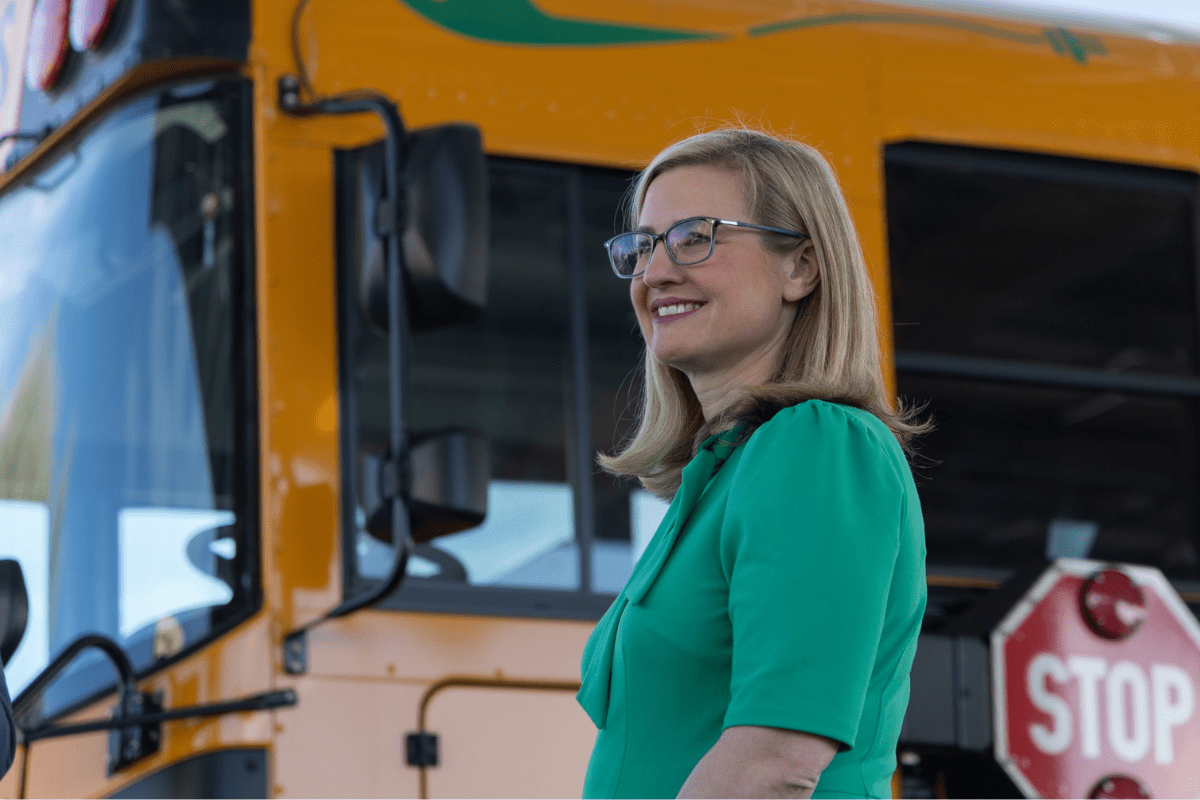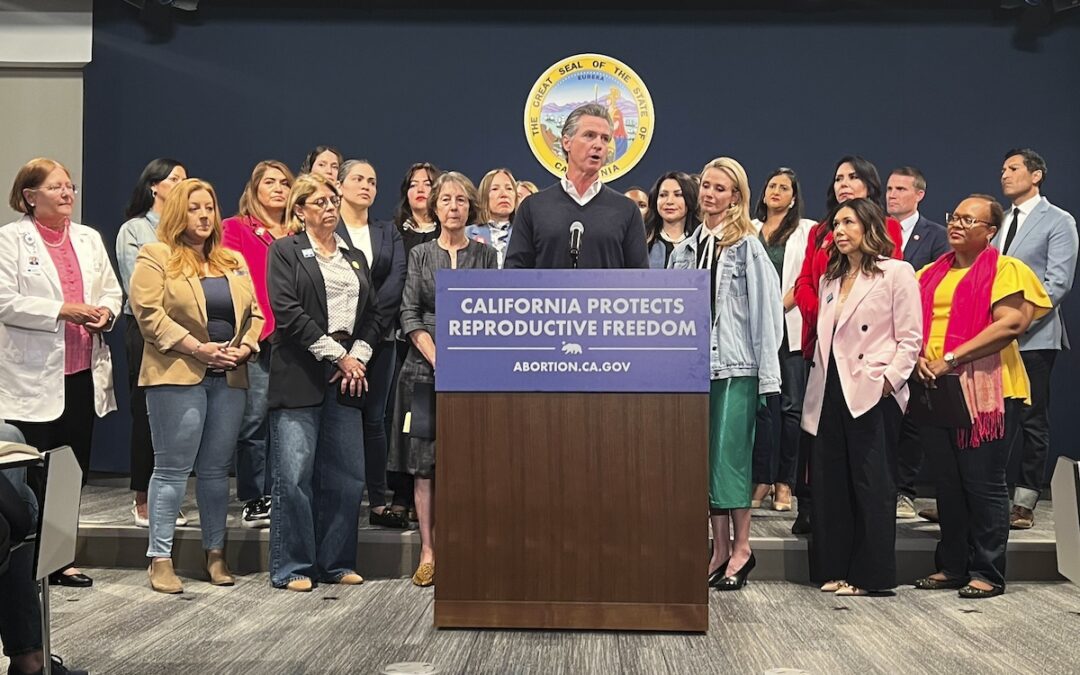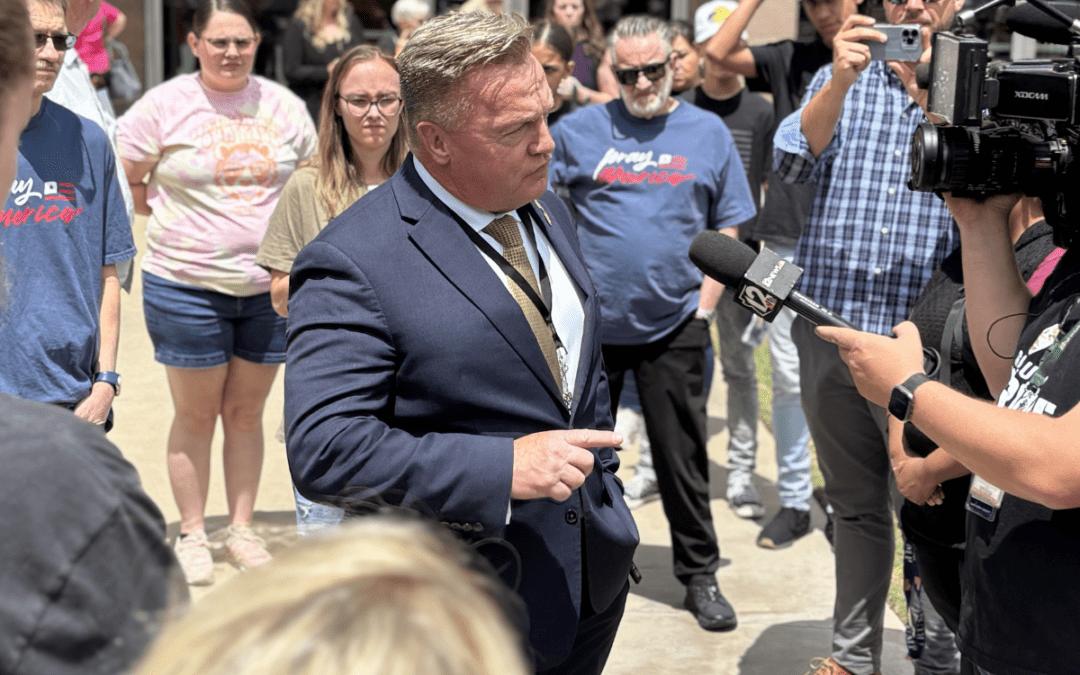
Phoenix Mayor Kate Gallego stands in front of Cartwright Elementary School District’s new electric school bus on Feb. 19, 2024, in Phoenix. (Photo by Sam Ballesteros/Cronkite News)
Leaders of Arizona’s public, private, and nonprofit sectors Monday discussed financial incentives in the Inflation Reduction Act, explaining how they will use available federal funds for conservation efforts and renewable energy projects.
The conversation centered around the Inflation Reduction Act’s direct pay provisions, which allow governments and organizations “to treat the amount of certain credits as a payment against tax on their tax returns and as a result receive direct payments for certain clean energy tax credits.” Eligible entities are local and state governments, federally recognized tribal governments and agencies, rural energy cooperatives, and other tax-exempt organizations.
Tom Perez, director of the White House Office of Intergovernmental Affairs, hosted the roundtable discussion with Phoenix Mayor Kate Gallego. Perez said the purpose of the discussion was to spread the word about the “seemingly limitless breadth of opportunity” provided by the new tax credits and federal funding.
“So if you think ‘Well, this is an interesting thing, but it really doesn’t affect my life,’ or ‘I can’t really benefit from it,’ I’m here to tell you that in all likelihood that’s not correct,” Perez said, noting that organizations might not be aware of their eligibility.
The direct payments for an eligible organization vary depending on the tax provision the project falls under. Some projects’ direct payments are determined on a per-unit basis, while others are in percentages.
Stephen Roe Lewis, the governor of the Gila River Indian Community, said he wants to use the funds to conserve water, expand the community’s solar-over-canal project, and build an electric vehicle charging station.
Lewis said the only way these projects have gotten done in tribal areas “is if developers own the projects from outside our tribal communities that we develop, and this is what kept most tribes, including the community, out of this so far.”
Ultimately, he said, the financial incentives will let the Gila River Indian Community and other tribal nations turn to renewable energy “on our own terms as tribal sovereign nations. Now, that’s self-determination.”
Stakeholders from Arizona’s nonprofit sector want to get the word out to nonprofits big and small that these funds are available.
Adrian Keller is the Arizona program director for Solar United Neighbors, a nonprofit dedicated to helping businesses, households, and nonprofits go solar. He said that the new tax credits will expand Solar United Neighbors’ reach.
“Because of how the tax credits used to be organized, most of our work in Arizona was restricted to helping homeowners and for-profit businesses, and that’s great. We want to help everybody go solar,” Keller said. “But as we’ve heard today already, that left out a huge portion of our community … that did not have any sort of financial assistance to afford to go solar.”
Keller said because of direct pay, Solar United Neighbors was able to help six Arizona nonprofits install solar arrays in the past year.
Investing in electric vehicles was a common goal among leaders in education and municipal government.
Cartwright Elementary School District’s Chief Financial Officer Victoria Farrar said she wants to expand the district’s fleet of electric school buses in addition to the one 84-passenger bus the district already has. She emphasized the importance of reducing pollution, speaking “as a person who has asthma who grew up in Arizona, my children who have asthma who are growing up here now.”
Gallego said the funding will help Phoenix’s sustainability push.
“We want to be a leader in electric vehicles, and so the fact that up to 30% of the cost might be covered is very important to us,” she said.
Gallego said the Inflation Reduction Act is an important step to making sustainability efforts more affordable and effective.
“It is the most important climate legislation in my lifetime anywhere in the world, and we just want to make sure people know about it.”
Politics

Gov. Gavin Newsom wants to let Arizona doctors provide abortions in California
California law generally allows abortion up to the point of fetal viability, which is around 24 weeks. SACRAMENTO, Calif. (AP) — Arizona doctors...

VIDEO: Arizona Attorney General Kris Mayes indicts 18 ‘fake electors’
@coppercourier An Arizona grand jury has indicted former President Donald Trump's chief of staff, Mark Meadows, lawyer Rudy Giuliani, and 16...
Local News

Escape the heat at these indoor pools in Tucson
Arizona: it's synonymous with sunny. Mix that sun with the sprawling urban blacktops and the result is the nationally recognized heat that is...

We asked, you answered: 7 music venues in Arizona for a more intimate show
The biggest artists in the world come to Arizona to perform at places like Footprint Center, State Farm Stadium, and Desert Diamond Arena. But what...




